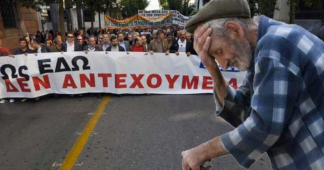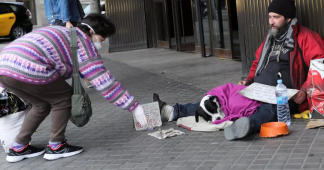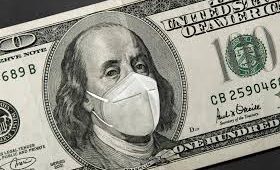by
We are living in extraordinary and exceptional times. Many have lost their jobs and incomes. The crisis is first and foremost a public-health crisis, but its economic repercussions demand a response which manifests our solidarity and which can help ensure basic living conditions throughout Europe and the wellbeing of all.
Unconditional basic income is today, more than ever, an essential step. It encourages solidarity because it is unconditional and universal. A crisis for which we had no responsibility, and for which no one is accountable, should be answered back through unconditional measures which do not damage future choices even further.
Sharp decline
We are witnessing a sharp decline in the world economy—a staggering picture considering initial predictions of growth for 2020. In the eurozone, the European Commission, several member states and the International Monetary Fund already assume a slump into recession. In some member states, budget deficits could rise to 7 or 10 per cent of gross domestic product, with extreme impacts on incomes and employment.
In Norway, for example, unemployment has already risen steeply, from 2.3 per cent to 10.4 per cent in just a few weeks. In Portugal, the finance minister, Mário Centeno, anticipates the crisis being much worse than the eurozone crisis, with unemployment also predicted to rise above 10 per cent.
Portugal was ravaged by austerity and two million people are at risk of poverty and social exclusion—roughly one in five of the population. Around one quarter live on the minimum wage and one third would be unable to cover unexpected expenses.
For all these people, any decrease in monthly income, still moreso unemployment, can be disastrous. Yet one million are already laid off, earning 70 per cent of their salary—part covered by the employer and part by government—and this number can only increase in the coming months.
That scenario is not confined to Portugal. In 2018, European Union leaders congratulated themselves on the fact that there were nearly 240 million Europeans in employment. But the job market is polarising: both high-paying and low-paying jobs are on the rise, as is job insecurity. The average income of the richest 1 per cent of Europeans has grown twice as fast as that of the bottom 50 per cent, while the poverty rate in Europe remains 21 per cent, the same as for nearly two decades.
Civic society mobilising
Not all the news is bad. In most countries, most people are helping each other. Companies are changing their business model to assist the national health system. Startups are joining forces, creating ‘hackathons’ to find innovative solutions to tackle Covid-19.
Civic society is mobilising throughout Europe to create networks of support for the most vulnerable citizens. People are singing and playing music in their balconies to share the burden of social distancing and quarantine. Never before has the role of civic society, and the importance of strong and resilient public health systems, been celebrated by so many from all segments of the political spectrum
Awareness of climate change is also growing. The decrease in carbon-dioxide emissions generated by the slowdown is raising the debate on ‘degrowth’ versus ‘green growth’ when economies start healing.
But a silver lining is not enough. Europe should step up to its task, and at least match the efforts of its civic society, member states, companies and individuals, in looking for innovative measures and strengthening solidarity networks in response to the crisis.
Clear, strong measures are needed, beyond ‘rescue’ packages which raise concerns of a further austerity wave in the eurozone and ‘quantitative easing’ with its mostly regressive impact. We need a unified policy which injects money into the economy quickly, with no intermediaries.
Social justice
For all these reasons, we advocate an unconditional basic income. A monthly payment should be provided for the duration of the crisis—a three-month measure which could be extended to six months—to all eurozone citizens, independently of what they do our how much they earn. We recommend a €350 UBI for all adults over 18. This is a higher amount than that proposed by Philippe Van Parijs, taking into account the significant loss of income most European citizens are facing.
It would be an expensive measure. But its impact in stopping the collapse in demand, and so supply, can compensate for its cost. Also, and most importantly, it is a matter of social justice.
Many of those hit hardest by the crisis have low salaries and insecure jobs—the basis of the economic growth in the eurozone in recent years. We all benefited from that economic development and it seems only fair that we all share the burden now, helping the most affected ensure they can face the current crisis while still enjoying basic living conditions and some quality of life.
This is not to say that individual eurozone countries should not contribute. On top of the European Central Bank issuing ‘helicopter money’, each member state could add a certain amount and increase the potential positive impacts of a higher UBI. In Portugal, for example, we could add €250 to the monthly payment. Over six months this would amount to 9 per cent of Portuguese GDP (2019 figures). But, by including a mechanism of repayment in two years (say)—where the most vulnerable and those who faced a significant loss of income would keep most or all of the money, while those with more resources and who did not face great losses would return most or the total amount—the additional budgetary cost could fall below 3 per cent of GDP (again 2019 figures). This would be a more reasonable cost, nonetheless representing the magnanimous, collective effort needed to avoid a major social as well as economic recession.
Exceptional times
Unconditional basic income is the most effective measure to tackle our current challenges—without bureaucracy and restrictions and without needing to verify those who are poorer and those who are more vulnerable. In extraordinary and exceptional times such as these, avoiding unnecessary procedures and ensuring no one who needs help is left behind is crucial.
The point is not whether we have the resources but to whom those resources should be directed: to the banks and companies, or to the people. We believe it should be to all. We should not disregard the support people need, by claiming that the money is better spent or needed most by companies and the financial sector. It is also not a discussion about which member states are dealing better with the crisis, which have the most resources and which are lagging.
It is about the eurozone recognising the equality of its citizens and restating the European Pillar of Social Rights, with its social commitment to all citizens alike. It’s about solidarity.
The EU might not have a second chance to contain not just the economic but, even more, the political effects of misjudged decisions. As many are saying, if not now, when? And if not this, for all of us, then what is the role of the EU?
* Catarina Neves is a teaching assistant in the Nova School of Business and Economics in Lisbon and is completing a PhD in political and social philosophy in the Centre for Ethics, Politics and Society at the University of Minho, where Roberto Merrill is assistant professor of philosophy. They are both involved in the scientific project Universal Basic Income Experiments, funded by the Portuguese scientific agency Fundação para a Ciência e Tecnologia, which he co-ordinates.











